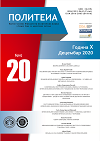Промене међународног поретка и Босна и Херцеговина – 25 година од Дејтонског споразума
Bosnia and Herzegovina and Changes to the International Order – 25 Years Since the Dayton Agreement
Author(s): Srđan M. PerišićSubject(s): Political history, Government/Political systems, International relations/trade, Security and defense, Transformation Period (1990 - 2010), Present Times (2010 - today), Geopolitics, Peace and Conflict Studies
Published by: Fakultet političkih nauka Univerziteta u Banjoj Luci
Keywords: international order; B&H; Dayton Agreement; unipolarity; multipolarity; NATO; Russia;
Summary/Abstract: The paper deals with the impact of changes to the international order on the position of Bosnia and Herzegovina over the period of 25 years, from the signing of the Dayton Agreement in 1995 to 2020. For a start, there is an analysis of all models of international order in that period. Furthermore, the paper analyses the unipolar international order as it existed until 2008 and its impact on the internal relations and political system in Bosnia and Herzegovina, as well as on the position of Bosnia and Herzegovina in Europe and the region of former Yugoslavia. In this respect, it particularly focuses on NATO’s activities in Bosnia and Herzegovina in that period and the position of the Republic of Srpska. The second period begins after the year of 2008, and it represents the growth of a multipolar international order. It is the impact of that order on Bosnia and Herzegovina and its internal situation that is discussed in the paper, with Russia’s return to the Balkans and its consequences analysed in detail. In addition, an analysis of the Chinese economic and geopolitical project entitled ‘Belt and Road Initiative’ and its impact on the region of former Yugoslavia, Bosnia and Herzegovina included, is given. In the presentation, as well as in the paper, one of the focal points is the respective position of Bosnia and Herzegovina and the Republic of Srpska within the context of NATO enlargement. The influence of the structure of the international project (nejasno, potrebno je definisati koji projekat, iz prethodnog teksta to nije vidljivo) on the states can be seen on the example of Bosnia and Herzegovina – according to the scheme given by the theorist Kenneth Voltz. The unipolar order, influenced by the then US administration, is the creator of the Dayton Agreement in 1995, as well as of the political and legal order in Bosnia and Herzegovina. The political processes that took place after 1995 were also affected by the unipolarity and power of the United States. This power was focused on efforts to turn Bosnia and Herzegovina into a unitary socio-political structure, that is. to change its Dayton design. The culmination of the power of unipolarity and the United States in Bosnia and Herzegovina is the acceptance by political elites of Bosnia and Herzegovina of the NATO integration process in the period of 2005-2009. The emergence of a multipolar order is blocking the process of Bosnia and Herzegovina joining NATO, with the Republic of Srpska stopping the transfer of competences to the state level.
Journal: Politeia - Naučni časopis Fakulteta političkih nauka u Banjoj Luci za društvena pitanja
- Issue Year: 10/2020
- Issue No: 20
- Page Range: 41-55
- Page Count: 15
- Language: Serbian

